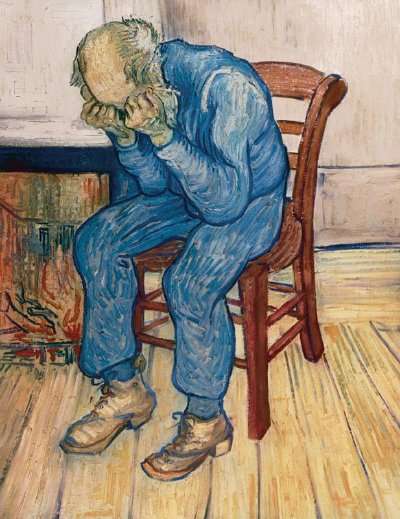I have heard some people (you probably have, too) talking about the course of their lives, and saying: “I wouldn’t change anything, I would have done the same thing over again.”
I find such statements utterly amazing. I think of my own experiences, and the lists of pros and cons that I used to make up when confronted with big decisions (often with equal numbers of pros and cons), and the numerous regrets that sometimes followed from my mistakes – and/or sins.
When I pray for the Poor Souls in Purgatory, I often visualize them suffering the consequences of bad choices, maybe wishing there was something they could do to go back and remedy this or that decision. But unfortunately, time only flows forward; you can’t go back in time.
I realize my sense of these matters has something to do with temperament. William James in his Varieties of Religious Experience, points out two opposite types of personalities – the “once born” and the “twice born.” The “once born” are those religious people who travel along what they consider to be a straight path, are generally satisfied with themselves, and have no regrets. The “twice born” are more introverted, dissatisfied with themselves and/or the world, experiencing conflicting desires, sometimes coming to a conversion experience and being “born again” into a happier state.
With regard to crosses (things about ourselves and others that we must bear), I would suggest a somewhat similar division:
1) There are numerous individuals, innocent but nevertheless afflicted by heavy crosses: for example, suffering from genetic diseases, undeserved mistreatment, rejection for disfigurement or speech disorders, or being persecuted by steadfastly following conscience instead of the crowd.
2) At the other extreme are those who have brought crosses on themselves: a man, maybe in prison, with a heavy sentence, because of a few moments of passion or revenge; or a woman with a brood, married to an alcoholic ne’er-do-well, because of youthful infatuation and “tying the knot” on a lark; or a partner joined to a bunch of corrupt business associates, because of young ambition and greed; or someone in mid-life dealing with a body often mistreated with illegal drugs, alcohol, overeating, etc.
Unfortunately, the latter extreme can’t easily say “how could God do this to me?” Or “why is God sending me such crosses?” Because they know how they got to this point; and they can’t go back and “take the right step.”

Most of us will find ourselves somewhere between the extremes.
But if we had our “druthers” about crosses, the best choice would always be the one that Jesus offers: “Take up my yoke upon you, and learn of me, because I am meek, and humble of heart: and you shall find rest to your souls.” (Mt. 11:29) Namely, the type of crosses that the Lord promises to fashion, apportioned to our weakness, and actually bringing about rest for our souls, not anxiety or resentment or the feeling of futility.
Enduring crosses for which we are not responsible can even bring a kind of delight – as with the Apostles who rejoiced, “that they were accounted worthy to suffer reproach for the name of Jesus.” (Acts 5:41) Or else the serenity of the “Little Way” of St. Thérèse of Lisieux – simply putting up with the everyday pains or sicknesses and irritations or even hostilities from others, and “offering it up.”
If you are not so innocent and inspired to do penance for sins, probably the best approach has been given by St. John the Baptist, when he was asked by sinners what sort of penance they should do, (Luke 3: 12-14) He told tax collectors to just do their jobs and not overcharge; he told the soldiers to be satisfied with their wages, avoid extortion, and not accuse others falsely – in other words, carry out your duties, use only necessary force, and be respectful of persons. No dramatic acts of penance, just conscientious movements forward, day by day.
This sort of spiritual advice was repeated to Lucia dos Santos, the seer of Fatima, who had become a nun, and wanted to respond to questions she received about what sort of penance God was asking for in the 20th century. In 1945, in an apparition to Lucia, Our Lord clarified what he was asking for: “The sacrifice required of every person is the fulfillment of his duties in life and the observance of My Law. This is the penance that I now seek and require.”
Crosses are inevitable. But whether they are the type that we bring on ourselves, or the better ones that we don’t invite, the advice of the Baptist and Jesus (to Lucia) is the most relevant thing for most of us.
If we had privileged access to the worldwide spiritual panorama, we would probably be struck by an almost infinite variety of crosses, many merited, many unmerited. We might find that those with particular types of crosses are best able to understand the situation of persons with similar crosses – and, vice versa, be able to be understood best by those with the same type of crosses.
When we hear a generic “I understand your situation,” this may be helpful and consoling. But to be confronted with a specific, “yes, I’ve been there, we are kinsmen,” is something different.
It is also helpful to remember that, in the mysterious Christian economy of salvation, the sufferings that we bear can somehow help procure salvation for others, probably for many persons we do not know.
But let’s hope – and exert ourselves this Lent so that most of our future crosses are “tailor-made,” and not the type that we bring on ourselves.















